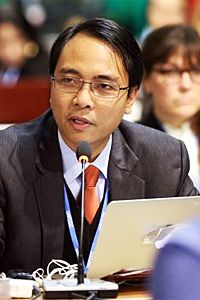
It's been a year of climate extremes that have battered and bruised dozens of countries across the globe.
Parts of Southeast Asia have faced challenges from a mix of monsoon flooding, extreme drought and repeated typhoons.
For a region that is home to the climate vulnerable megacities of Bangkok, Jakarta and Manila, these are just some of the risks that are expected to worsen as the ominous threat of global warming looms ever closer.
But if Southeast Asia is on the frontline of climate change, if it shows the type of bold climate leadership that the world needs, it can also be at the forefront of the solution.
This week Bangkok is hosting a preparatory meeting for this year's COP24 UN climate talks in Poland, and it's crucial that the region's leaders grasp the urgency of the situation and bring a message of change into the UN conference.
This is the moment of truth in the fight against climate change. The actions we take now and in the years ahead will determine whether we succeed in limiting global warming to the thresholds outlined in the landmark Paris Agreement.
In Bangkok, negotiators need to make real progress in delivering a draft text of the Paris Agreement rulebook. This will enable negotiators to adopt crucial guidelines at COP24 and put the next phase of climate action to work. This rulebook has to be robust and clear, setting firm foundations that enable countries to move forward.
The current pledges of the Paris signatories fall far short of where we need to be and place the world on a trajectory towards global warming of 3C or more; a trajectory that would be disastrous for a region already suffering from climate change. In October, the UN's climate change panel, the IPCC, will release its report outlining what needs to be done to limit global warming to 1.5C and the ramifications if we fail to achieve it.
The consequences will be dire for cities like Bangkok, Ho Chi Minh City, Manila, Jakarta and Yangon, all of which are highly vulnerable to rising sea levels, floods, and other impacts of climate change.
Bangkok is already sinking one to two centimetres a year, and a recent World Bank report said that the capital could be partially submerged by 2030 due to extreme rainfall and rising sea levels.
The urgency of phasing out the use of fossil fuels cannot be overstated. To embrace renewable energy is not a vague option, it is an imperative that our region's leaders must face. Thailand's Intended Nationally Determined Contribution (INDC) targets a 20-25% cut in greenhouse gas emissions by 2030, but significantly greater ambition is required. Only a transition to 100% renewables will allow us to achieve a carbon neutral global economy by 2050. And yet, analyses project that coal will be the fuel of choice for economies in this region, with Southeast Asia far outpacing other regions in coal demand growth. Indonesia is still the world's second-biggest coal export country and Thai companies continues to invest in coal mining operations in Australia, Mongolia, China, the US and Indonesia. These are not the actions that will deliver us security and climate justice.
Southeast Asia is therefore a key battleground in the fight to avert climate crisis. Success hinges heavily on the region's expanding megacities that are poised to contribute more than half the rise in global greenhouse gas emissions over the next 20 years.
Our vision of a renewable-powered Southeast Asia is strongly anchored in our pursuit of climate justice, which can only be served if we transform the current energy infrastructure into one that is people-centred, socially just and protects the climate and environment for future generations. This vision of a new world means we must dismantle the power dynamics and financing that promulgates fossil fuel investment in the region. As our climate changes, and solar and wind power become the solutions of today, the people of Southeast Asia are already rejecting coal, embracing renewables and standing up at grassroots level against dirty energy development.
It is here, at the turning point of our generation, that our leaders must act to defend us from the ravages of global warming and end the age of fossil fuels. Our survival and the future of our countries are at stake.
Now is the time to chart a new course, one that starts here in Bangkok and helps to drive climate ambition through to COP24 and beyond. These are the moments in time that will define our legacy.
Yeb Sano is executive director of Greenpeace Southeast Asia.
